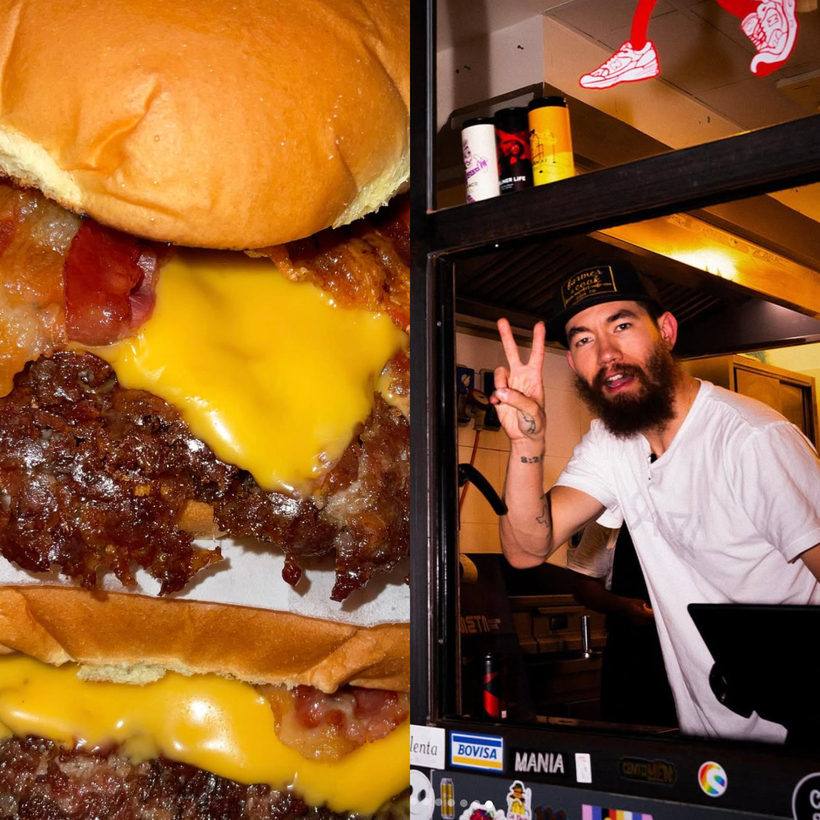In Milan, smashburger restaurants styled after New York hot spots such as 7th Street Burger are all the rage. Think graffitied walls, pounding hip-hop, and the essentials: thin patties of ground chuck, white onions, pickles, and cheddar, all tucked into a Martin’s potato bun.
The trend took hold of Italy’s fashion capital in 2022, when Chuck George, a 37-year-old Filipino-American entrepreneur, opened Chuck’s, a small spot inside Sidewalk Kitchens, a collective of independent restaurants near the city center. His strict “no modifications” rule (“If you want to change an ingredient, you aren’t eating Chuck’s”) and sleek branding quickly inspired a slew of copycats across town.
“The problem is, most of the people opening smashburger bars have no cooking background,” says George. “They’re all finance guys with zero interest in food.”
For him, the formula has proved so successful that he’s expanded across Europe: a weekly pop-up inside the Hôtel Grand Amour, in Paris; a Rome outpost in 2023; an American-style bistro in Madrid. “I’m not just a burger guy,” George says when talking about the Madrid restaurant, which pays homage to his mixed heritage by blending the all-American burger with Asian-fusion dishes like kinilaw, a Filipino-style ceviche.
This month, George will bring his burger to London, opening a Chuck’s inside Carousel, the culinary complex on Charlotte Street, in ritzy Fitzrovia, a stone’s throw from the British Museum.
“If you’d told me three years ago there’d be a Chuck’s in London, I wouldn’t have believed you,” he says. “But here we are.”

Far from black cabs and English brownstones, George grew up in McLean, Virginia, near the Potomac River, about a 30-minute drive from Washington, D.C. He was raised by his Filipino-American mother and American father, who served in the military and was stationed in Virginia Beach. “We were lucky. We didn’t move around too much,” he says. “I wasn’t an army brat.”
As a kid, George often imagined following in his father’s footsteps, working in defense or national security. In 2005, he enrolled at the University of Virginia, in Charlottesville, to study politics. After graduating, in 2009, he took a job in risk mitigation and private intelligence.
By 2013, though, George was burned out. He moved to Las Flores Canyon in Malibu, bought a 1960s pickup truck, and started a year-long sabbatical.
It was in California, where he met the young English chef Jonathan Collins, that he realized he wanted a career change. Their shared love of food led Collins to introduce him to Phil Winser, a co-founder of the creative agency and hospitality group Silkstone and the force behind the now closed New York restaurants the Leadbelly and the Fat Radish, as well as the London pubs the Pelican and the Hero.
“I joined the team practically overnight,” George says. Leaving behind politics and private intelligence for good, he turned to creative direction and launched a brand-partnerships division. But it was food that ultimately drew him in, and he began working evenings as a line cook at the Fat Radish. By 2019, he was Leadbelly’s head chef.

The pandemic, which shuttered both the Leadbelly and the Fat Radish, took his life in yet another direction. George met an Italian woman. He married her and moved to Florence, where he co-founded the app Knead, a software platform designed for bakery productivity. But the marriage soured. In February 2022, the couple divorced, and George was suddenly without European papers. Creating a small business “seemed like an obvious solution,” he says, given Italy’s Startup Visa, designed to give residency permits to non-E.U. citizens who launch companies that create local jobs. A month later, he unveiled Chuck’s.
As he prepares to take on the trickier London market, as well as Amsterdam later this year, George remains undaunted. Whether it’s Milan or Madrid, Paris or Rome, the formula seems to travel well. Just don’t ask for ketchup on the side.
Elena Clavarino is the Senior Editor at AIR MAIL


